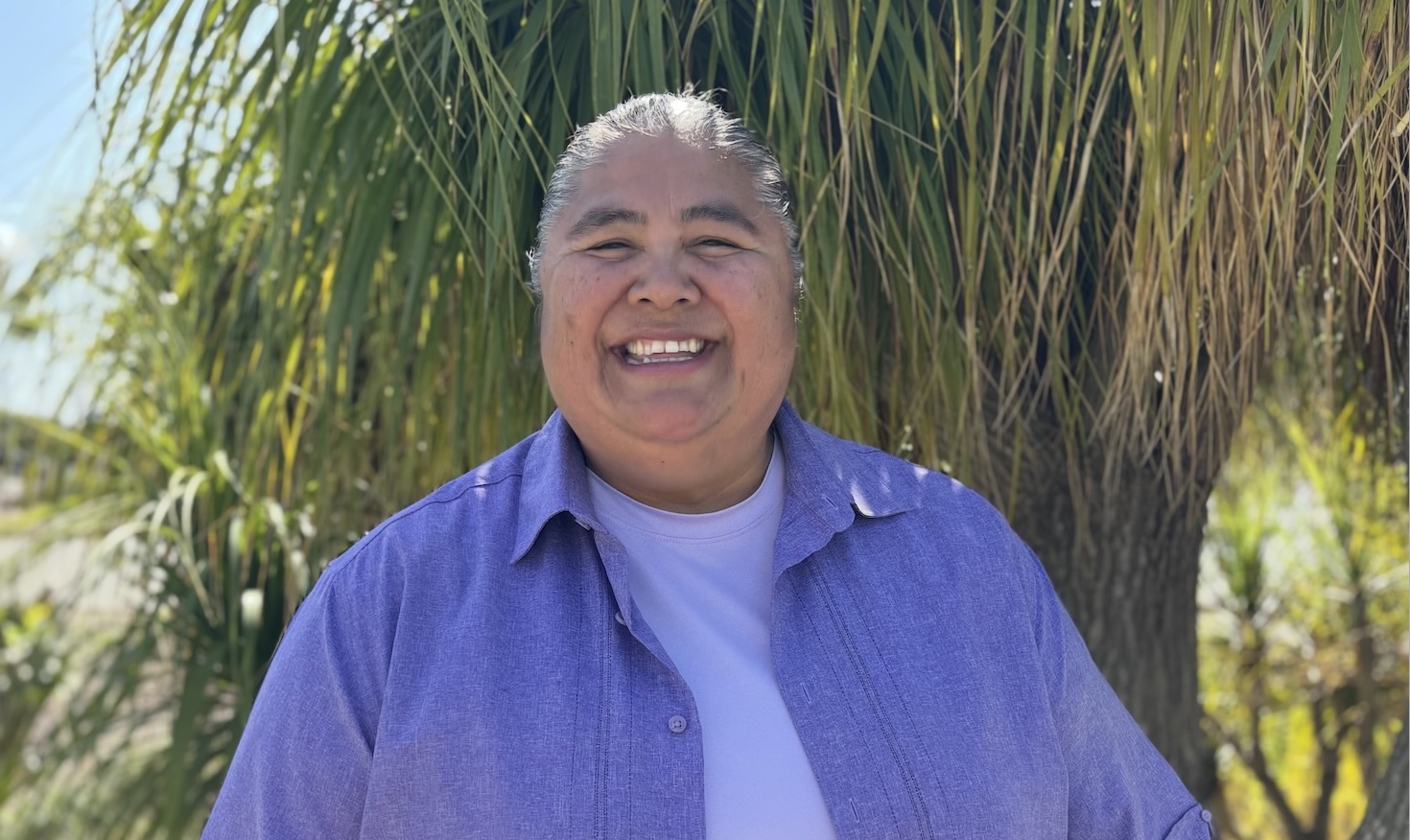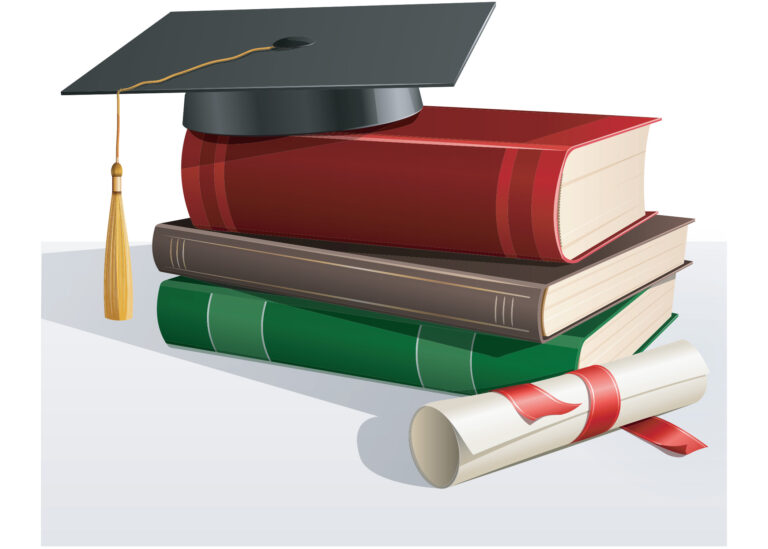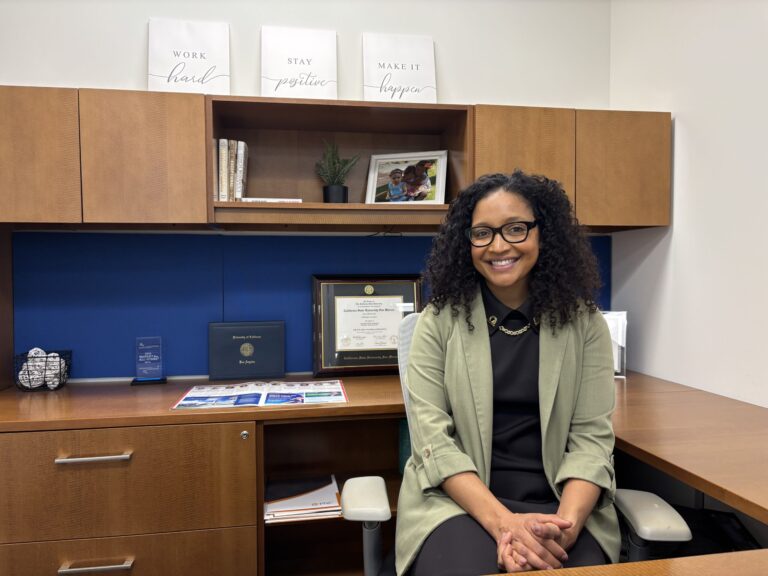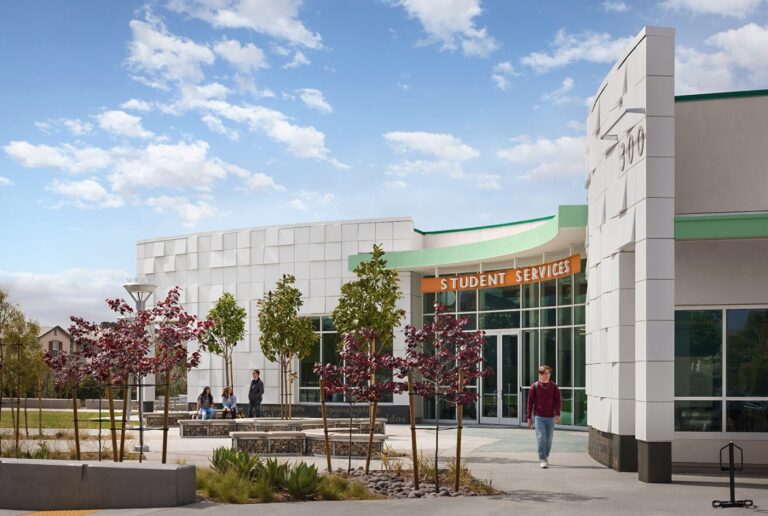Education: Her Key to Understanding Her Value as a Woman and a Latina
By Melanie Slone
“Growing up, the way my family saw it was that women weren’t of value,” says Gaby B. Love. But her maternal grandmother, Victoria Gómez, believed in schooling and empowered her. “Had it not been for education, I would not have known my worth as a woman and Latina.”
Today, as the outreach coordinator at MiraCosta College, Gaby “empowers young Latinas to consider education…When we see a Latina move up, it’s this pride that we’re part of helping them up.”
Never Give Up
Gaby’s parents, whose families emigrated from Jalisco, Mexico, to North County San Diego, followed traditional machista customs. But Gaby says her more impressionable years were spent with her grandma. “She really tried to take care of me as a female, making sure that I understood my value, my worth.”
Gaby learned what hard work was in landscaping with her dad as a young girl. “Here I was a girl, pushing the lawnmower and raking…hard labor. …That’s how my dad prepared me for life…. Growing up in the areas where I was, between Solana Beach and Encinitas, we didn’t really see Latinos succeed as much.”
When she realized her peers at Torrey Pines High School were applying for college and scholarships, she thought she should apply, too, even though her school counselor “dismissed her” and suggested she go for certificate or vocational programs instead of college.
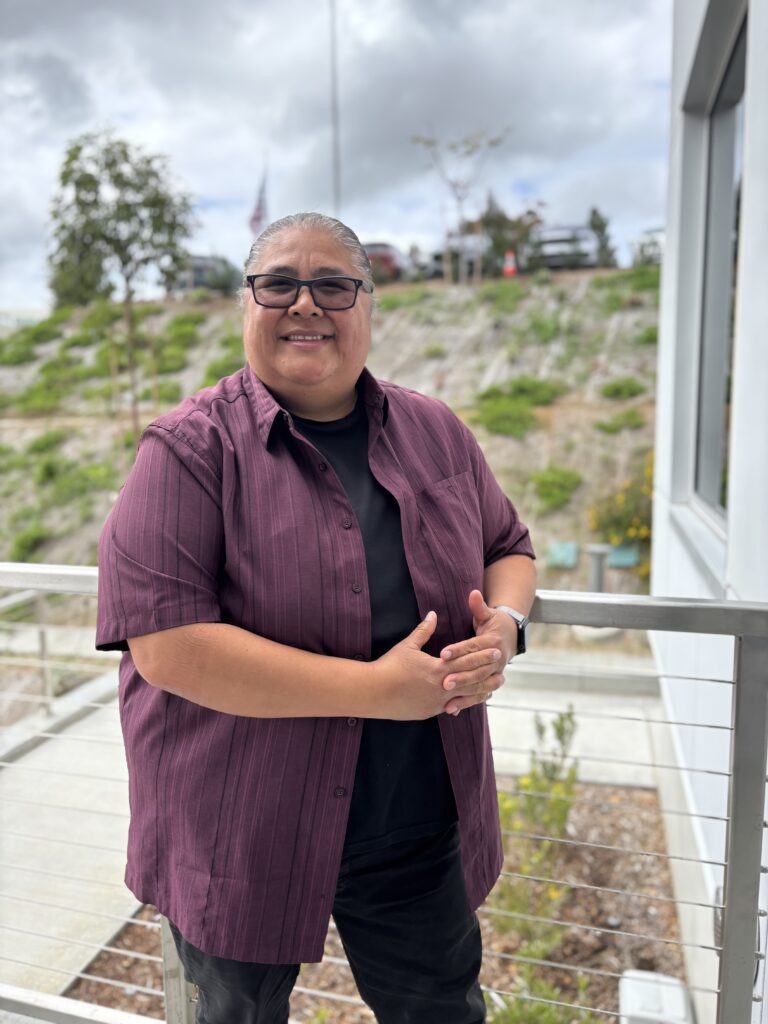
This counselor’s words left her “hurt and angry,” but others in her life pushed her to move forward. As a first-gen college applicant in a time before Internet, Gaby faced many obstacles. “No one teaches you this.” With a lot of effort, she was able to apply to colleges and for scholarships. “And I started getting acceptance letters.” She remembers the impact of getting those letters and holds onto them even today. “I needed those reminders that I was worth that spot.”
Every opportunity Gaby got for work was in education. But her dad told her, “It’s a waste of time. Don’t go in to teaching. If you’re going to go to school, go to become a lawyer or go into medicine…” She felt her father would be accepting of a degree in physical therapy, so her plan was to study that at Northern Arizona University.
It was hard work to convince her parents, but they finally dropped her off in Arizona with a suitcase her soccer coach had gifted her and a mayonnaise jar full of coins that would get her through the semester along with her scholarships.
But it wasn’t to be. The housing office expected her to pay an $800 deposit, which she didn’t have. “I was devastated. I had to call my parents to come back and pick me up.” It “was the biggest, most embarrassing, most shameful thing to have to do,” facing the future ridicule and negativity. But she came home, “and the very next day, I showed up at MiraCosta and signed up for classes.”
Moving Forward
Gaby’s time as a student at MiraCosta College, “was like this utopia of Latinos…It was kind of like this unspoken thing that we could see in each other’s eyes…Let’s stick together.” She and other first-gen Latinos shared food, books, and encouragement.
At MiraCosta, Gaby took part in MEChA, PUENTE, Latina Leadership Network, and more, “these different groups that really tailored to the Latina experience and that cultivated this energy for a lot of us to be like, okay, we’re going to transfer.”
Gaby explained to her parents that “Education is long-term. It’s not short-term. Education is a sacrifice of time and money.” She never stopped working and got scholarships and financial aid, finishing her degree in healthcare administration at Long Beach State.
After graduating, she continued to work in education in the San Dieguito District, where she was offered an internship job. “Everybody I was around was always in education, and they would share their stories. And they were all Latinas or very involved in the Latino culture and the bilingual program.”
Because she was so good at math, she was asked to get an emergency credential to teach it, and Gaby never turned down a single opportunity. “Every opportunity I got that was in education fueled me so much that I was like, you know? Maybe I do want to go into education.”
As one of the few Latinas teaching at that time, she forged strong relationships with her students, “having been in their shoes not too long ago.”
In the pilot program Having a Voice, she learned from students that, “Unfortunately, the stories aren’t different. Everything they speak of resonates with me, and everything I speak of resonates with them. And that’s also very sad because we should be moving forward, but we’re not there yet.”
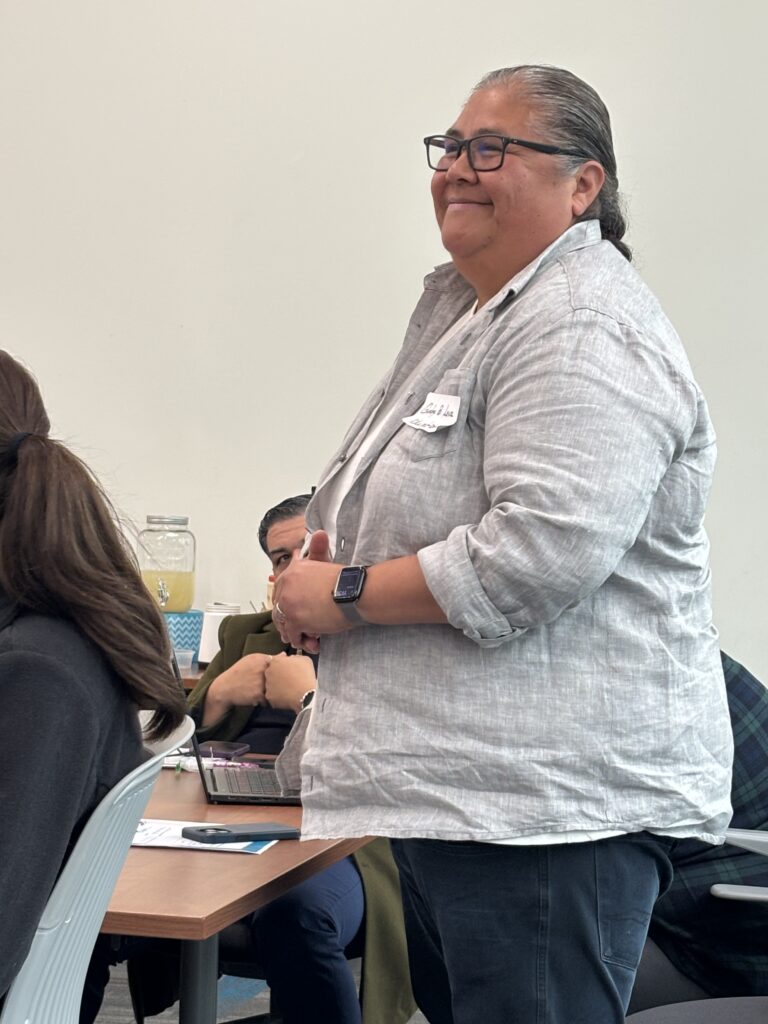
Coming Full Circle
Gaby explains that imposter phenomenon means “we don’t think we belong in a certain space. We don’t think we’re worth it.” But “I’m here to tell you, I’ve been there. I’m coming back to let you know that it’s totally possible. It’s not easy. But it’s so worth it. Because now you get to do something that you’re passionate about, you get paid, and you get benefits.”
Eventually, she was offered a job through the County Office of Education Migrant Education Program. As a social worker, advocate, tutor, and counselor, “I thrived,” she says. “I didn’t realize at the time how connected I was to the migrant community and how much of my history was part of the current history of these families I was working with.”
After working for 17 years there, she says she got comfortable. “There will be a point you outgrow your job. When you outgrow it, it’s okay to seek other places and get paid for that experience and that knowledge and those skills.”
When she decided to go for her current position an MiraCosta, Gaby says she practiced her interview process over and over until she felt comfortable. “I had never done an interview this scale before—résumé, cover letter, interviews.” She got the job.
“This has been a dream job because I remember coming onto campus and that utopia feeling,” she says. “We all became empowered when we came here…I remember when I graduated, I said, wouldn’t it be so cool if one day I could come back?”
Paying It Forward
Today, Gaby passes on what she’s learned to the migrant and other communities she’s worked with in North County, talking to parents about their kids going to college “because we all don’t get here.” She is grateful to report that there are now many support systems and resources for students.
“Some of my students I’ve worked with since they were like 2 years old and now over here in college, helping those same communities and still having those conversations with the families.”
She urges others to work toward something that interests them. “Make it something you’re passionate about…Do what you love and get paid for it.”
She adds, “Whatever challenges you have at home, education is definitely for you…a certificate, AA, bachelor’s degree, or beyond, so you can provide for yourself…thanks to your education, skills, and experience.” She herself still hopes to get her master’s. “I want to make sure our parents understand that their kiddos have an opportunity if they can just get a little bit more education.”
Honoring Inclusivity
Growing up, Gaby felt like a “token” Latina in her community and was in “a machista household” with brothers, at a school with “haves and have nots,” and in a community that saw her as “not Mexican enough and not American enough” until she learned the value Latinos have always had in the history of California.
As she grew, she realized there was a word for what she was discovering: inclusivity. “DEI means Diversity, Equity, and Inclusion. We need diversity for better ideas, inclusivity for more love and empathy, and equity—everyone deserves an opportunity, regardless of family wealth and connections.”
Today, says Gaby, some people do not want to be inclusive. “That makes no sense,” she adds.
Growing up, “College was very liberal. And for my parents, the US was very liberal compared to Mexico at the time.” As a young girl, Gaby faced this mindset. Later, she realized she was in love with her now wife. “It wasn’t until this relationship that I finally understood why I saw so few people openly gay.” It is looked down upon in education and in her communities.
But, she says, “If I can prove myself just by being me, if they see me first, they’ll see it doesn’t change who I am…Latina and LGBTQ+ are additions rather than deficiencies. That makes me even more special.” Gaby hopes to help today’s kids progress faster, “do better than our generation in every aspect.”
With a degree in healthcare and years of experience in education, Gaby knows how education impacts health. “The healthier we keep our community and the more knowledge given, that benefits that community and every community.” She advocates for clinics and resource centers and for the empowerment of individuals and communities.
Hold one hand forward to those pulling you up and the other hand back for those you’re pulling up, she says. “Hear from other women and learn from them…Our students are our best teachers. The community and students are my best teachers,” says Gaby B. Love.

